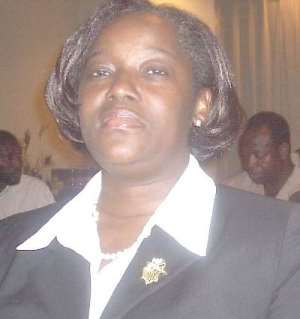
The Acting Commissioner of the Commission for Human Rights and Administrative Justice (CHRAJ), Ms. Anna Bossman has advised the government not to attempt to regulate the media because of the important role it plays as a promoter of public accountability.
In her view the emergence of an independent media in Ghana with a zeal for investigative journalism has served as a regulator, not only for governments but other institutions, including CHRAJ.
She was full of praise for the media for exposing corruption which triggered investigations and led to the resignation of affected public officials over the years.
Ms Bossman was speaking on the topic "The Media, the Law and Public Accountability" at the 2nd Bannerman Memorial Lectures in Accra under the auspices of the Africa Institute of Journalism and Communication, (AIJC).
She however, cautioned that a favourable legal regime for a free, pluralistic and independent media should not be a license for irresponsible journalism. "Journalists must ensure that objective reporting, moral values, higher profes¬sional standards and respect for differences of opinion become the standard bearer of the code of eth¬ics."
She pointed out that there is a disturbing but credible reports of an emerging practice of media practitioner shake-down/blackmail and "pocket book" journalism.
She regretted that many people have had their reputation tarnished by unscrupulous reporters who did not bother to check and cross check their facts before putting them out, while some have used what she described as their "undisputed platforms" both to promote their own agendas or the agendas of politicians and influential persons.
"The absence of censorship should not be taken as a license to say or do anything at all. The media is accountable to the public as a repository of public trust, that is to say the media has a constitutional duty of upholding the responsibility and accountability of the government to the people," she emphasized.
Even though she concedes that every journalist has a right to sell his story, she said it is incumbent on journalists to balance public interest, commercialism and their integrity and professionalism."
Ms. Bossman however acknowledged that most media houses and journalists do take pride and professionalism in their trade and for these, integrity and discipline outweigh commercialism and opportun¬ism.
She expressed the view that both civil society and the media in Ghana seem to be losing their zeal on anti-corruption reforms under the current administration.
She explained that the effectiveness of the media in the promotion of public accountability and anti-corruption in Ghana is severely hampered by huge gaps in levels of professionalism and integrity among media practitioners.
In spite of this, she said, "The media and civil society in Ghana has no doubt been an important driver of change in our country. As has been noted, excellent investigative work by some of the new independent newspapers helped to put corruption on top of the Public Agenda."
Ms. Anna Bossman deduced that a lot of people believe what they see and hear in the media as the gospel truth and that given this powerful influence, the media undoubtedly has an enormous and invaluable role in the promotion and protection and the enforcement of the fundamental human rights of the citizenry.
The Acting CHRAJ Commissioner recalled that two decades ago the press in Africa was reluctant and unable to expose human rights and other abuses and violations committed by military regimes and civilian dictatorships as they had no legal protection.
Conscious of this, she said the 1992 constitution provided important safeguards with regards to press freedom. Dr. Audrey Gadzekpo of the School of Communications Studies who chaired the function was proud that Ghana has one of the freest media in Africa, according to Freedom Houseratings.
She however urged the media to be self reflective and make itself relevant. "It is time for the industry to look inward and take stock of what they have achieved and the way forward."
The Bannerman Memorial Lectures were instituted in March 2006 to honour pioneering journalists, Charles and Edmund Bannerman. Charles, the eldest is said to be the first full-blooded African to edit a newspaper, the West African Herald in 1858.
Edmund succeeded him as the editor of the Herald that influenced the growth of a plethora of other vigorous nationalistic newspapers in the Gold Coast such as The Standard and West African Times.
Source: Public Agenda




 Akufo-Addo commissions Phase II of Kaleo solar power plant
Akufo-Addo commissions Phase II of Kaleo solar power plant
 NDC panics over Bawumia’s visit to Pope Francis
NDC panics over Bawumia’s visit to Pope Francis
 EC blasts Mahama over “false” claims on recruitment of Returning Officers
EC blasts Mahama over “false” claims on recruitment of Returning Officers
 Lands Minister gives ultimatum to Future Global Resources to revamp Prestea/Bogo...
Lands Minister gives ultimatum to Future Global Resources to revamp Prestea/Bogo...
 Wa Naa appeals to Akufo-Addo to audit state lands in Wa
Wa Naa appeals to Akufo-Addo to audit state lands in Wa
 Prof Opoku-Agyemang misunderstood Bawumia’s ‘driver mate’ analogy – Miracles Abo...
Prof Opoku-Agyemang misunderstood Bawumia’s ‘driver mate’ analogy – Miracles Abo...
 EU confident Ghana will not sign Anti-LGBTQI Bill
EU confident Ghana will not sign Anti-LGBTQI Bill
 Suspend implementation of Planting for Food and Jobs for 2024 - Stakeholders
Suspend implementation of Planting for Food and Jobs for 2024 - Stakeholders
 Tema West Municipal Assembly gets Ghana's First Female Aircraft Marshaller as ne...
Tema West Municipal Assembly gets Ghana's First Female Aircraft Marshaller as ne...
 Dumsor is affecting us double, release timetable – Disability Federation to ECG
Dumsor is affecting us double, release timetable – Disability Federation to ECG
